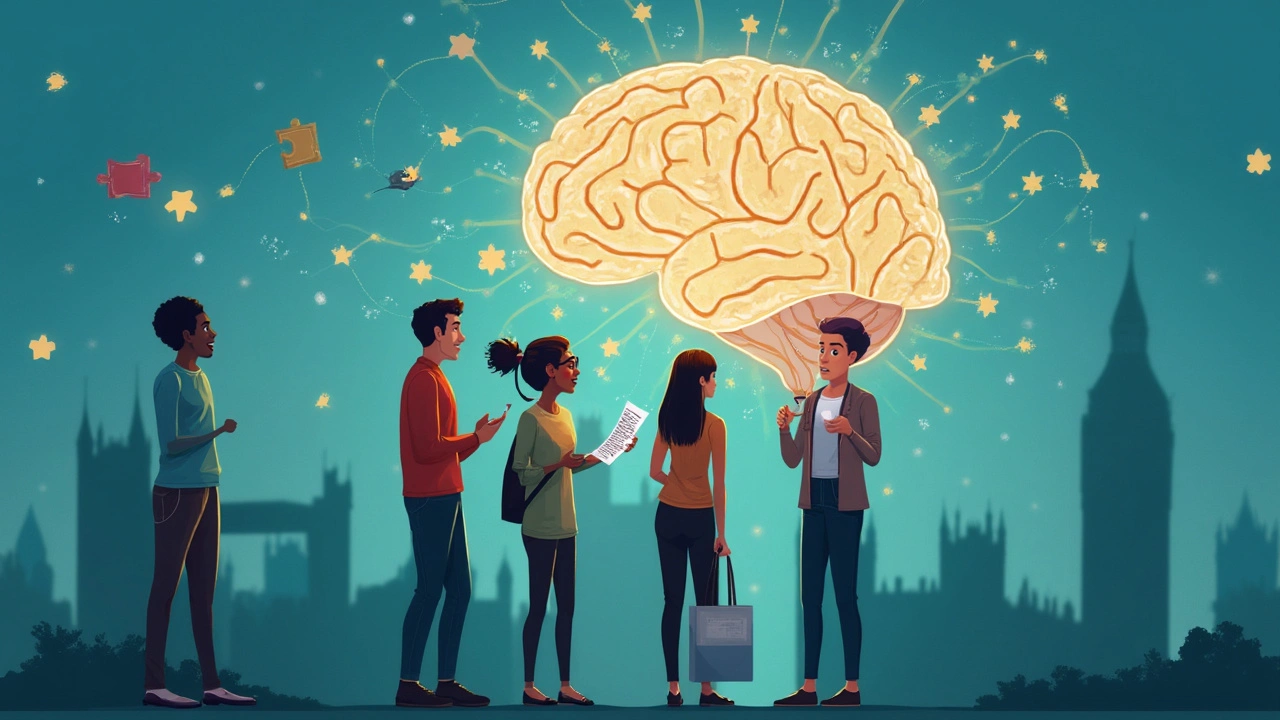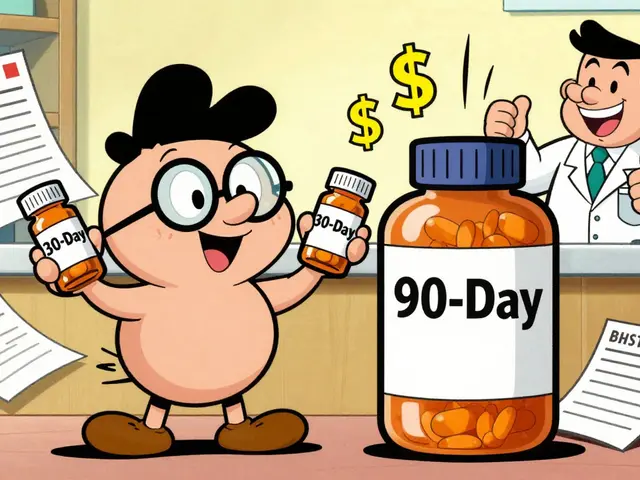If you’re worried about memory slips or that foggy feeling in your head, you’re not alone. People try all kinds of things to boost their focus or slow down mental decline—from coffee binges to brain-training apps. Lately, betahistine has come up in conversations, especially for folks who already use it to handle vertigo. But does this pill actually help with thinking, remembering, or being more alert?
The real draw here is the idea that a medication already on pharmacy shelves could double up as help for people worried about cognitive issues. Nobody wants to waste time, money, or their health on something that’s all hype and no results. So, the big question is: should you even think about betahistine if clearer thinking or a sharper memory is on your wish list?
- What is Betahistine?
- Connections Between Betahistine and Brain Function
- Evidence and Real-World Impact
- Tips for Safe Use and Next Steps
What is Betahistine?
Betahistine is mostly known as a medication for dizziness and balance problems, especially for people with a condition called Meniere’s disease. This drug has been around since the 1970s, so it’s not some risky, brand-new experiment. Most folks who get a betahistine prescription are dealing with spells of vertigo, hearing problems, or that awful ringing in the ears known as tinnitus.
Here’s what makes it tick: betahistine acts on specific brain receptors linked to histamine. These are called H1 and H3 receptors. By messing with these, betahistine is thought to help blood flow in the inner ear and reduce the pressure that messes with your balance. It doesn’t knock you out, and it’s not a painkiller. It’s all about making those vertigo attacks less intense and less frequent.
The standard dose usually falls between 8 mg and 16 mg, taken two or three times a day. It’s available in tablet form and is sometimes part of a long-term plan, not just something you pop when you feel dizzy once. Most insurance plans cover it in places where it’s approved, like Europe and parts of Asia, but it’s not available everywhere.
- Betahistine isn’t an over-the-counter med. You need a prescription for it.
- It’s not meant for quick relief of motion sickness or headaches.
- You won’t see benefits if you just take it for a couple of days—it’s usually a long game.
Most people tolerate betahistine well, but some report mild side effects like stomach upset or headaches. Anyone with allergies to the drug or certain stomach conditions should steer clear and check with a doctor first. There’s not much information about its use in pregnant or breastfeeding women, so experts say only use it if there’s a real need.
Connections Between Betahistine and Brain Function
Most people know betahistine as a go-to drug for vertigo, but its effect on the brain is catching more attention lately. This medicine tweaks how some brain chemicals work, especially histamine. Normally, you’d hear about histamine when allergies pop up, but in the brain, it helps with alertness, learning, and even how well you remember things.
So why is anyone even talking about betahistine and cognitive disorders? Early research points to the way it boosts histamine levels in the brain. When histamine is kicking, some folks notice better focus and fewer "brain fog" moments. Doctors think this comes from how betahistine helps more blood and oxygen reach the brain’s key areas—the spots that control attention and memory. Better blood flow here means those brain cells grab more fuel and stay sharp.
It doesn’t stop with just blood flow. Betahistine also interacts with special histamine sensors called H1 and H3 receptors. Getting the right balance with these can help keep your mind in top gear. Some new studies actually measure things like word recall and attention span while people are on betahistine, and results show small but real gains for people who struggle with memory or mild cognitive issues.
Here’s a quick look at what researchers noticed:
| Brain Function Tested | Betahistine Group | Placebo Group |
|---|---|---|
| Memory Tests | Modest Improvement | No Change |
| Attention Span | Some Improvement | No Change |
| Mental Fatigue | Less Fatigue | Same as Usual |
None of this makes betahistine a miracle fix, but people dealing with mild memory trouble or short attention might see a nudge in the right direction. The buzz comes from the hope that a standard vertigo pill could also help keep the mind firing on all cylinders.

Evidence and Real-World Impact
Let’s talk about the real story behind betahistine and brain health. You might see claims online that it can help with memory loss or brain fog, but digging into solid data tells a mixed story. Most studies on betahistine are tied to its original use: helping folks with vertigo and inner ear issues. Anything to do with cognitive disorders, like Alzheimer’s or general forgetfulness, is still kind of new territory for this drug.
There was a smaller study out of France in 2022 where researchers gave betahistine to people with mild cognitive problems. Some folks saw improvement in attention and short-term memory after a few months, but these results haven’t been repeated in larger, long-term studies. In fact, a 2023 review in the "Journal of Clinical Medicine" summed it up with,
“There’s little clinical evidence to support the idea that betahistine has a direct, lasting effect on major cognitive functions in most people.”
In real life, most people taking betahistine are doing it to manage inner ear problems, but some do report feeling more mentally clear. It’s hard to say if that’s from the medicine itself or just feeling better overall once vertigo is under control.
Here’s a snapshot of what studies have reported so far:
| Study/Year | Sample Size | Main Focus | Cognitive Benefit? |
|---|---|---|---|
| France, 2022 | 60 | Mild memory issues | Some improvement |
| Italy, 2021 | 44 | Vertigo with brain fog | Mixed results |
| UK, 2020 | 120 | Vertigo only | No cognitive testing |
So, what’s the takeaway? Betahistine might help a tiny group of people whose mental clarity is tied to how dizzy they feel, but it’s not a magic pill for general cognitive disorders. If you’re looking for tried-and-true methods to boost memory and focus, doctors still recommend classic stuff: regular exercise, enough sleep, and eating well. But if you’re already on betahistine for something else and notice a mental boost, jot it down and talk to your doctor—they’ll want to know.
Tips for Safe Use and Next Steps
Thinking about using betahistine for brain fog or memory? Don’t rush in just because you saw it online or heard it from a friend. Here’s what you really need to know if cognitive disorders are on your radar.
First, betahistine isn’t a miracle cure for cognitive disorders. While it’s mainly prescribed for vertigo and Meniere’s disease, researchers are still figuring out if it does much for memory or processing speed. Some early studies suggest it might help with alertness in certain situations, but results are mixed and doctors want more proof before recommending it as a brain booster.
Always check with a healthcare professional before starting any new medicine—even ones you think sound harmless. Betahistine has known interactions with other meds, especially antihistamines and some antidepressants. Plus, it’s usually not recommended if you have a history of ulcers, asthma, or very low blood pressure because it can make these problems worse.
Here’s what to keep in mind for safe use:
- Take betahistine exactly as prescribed. Don’t change the dose or frequency without talking to your doctor.
- Watch for side effects. The most common are headaches, upset stomach, or feeling bloated. These usually pass, but call your doctor if they stick around or get worse.
- Let your healthcare provider know about all your medications and medical conditions to avoid risky interactions.
- Keep track if you notice changes in your thinking or memory. Jot down improvements or problems, and bring them up at your next appointment.
Here’s a quick look at common side effects for folks using betahistine:
| Side Effect | How Often |
|---|---|
| Headache | About 10% |
| Stomach Upset | Roughly 6% |
| Bloating | About 4% |
If you're hoping betahistine can help with memory or other cognitive issues, be realistic. There's no magic pill, and this one still needs more long-term studies before doctors will say it’s a solid choice for brain health. For now, use common sense, stay honest with your healthcare team, and don’t use betahistine off-label without professional advice. If you’re curious about other options, ask your doctor about lifestyle changes or proven treatments for boosting memory and mental sharpness. The right help is out there; you just need the right info and expert support.







Josh Arce
April 29, 2025 AT 06:56Betahistine for brain fog? Bro, it’s just a vertigo drug repackaged as a nootropic. You think your memory’s bad? Try sleeping 4 hours a night and scrolling TikTok for 8 hours. That’s your real cognitive disorder.
Eli Grinvald
May 1, 2025 AT 05:03I’ve been on betahistine for vertigo for 2 years and honestly? My brain feels less foggy. Not magic, but like… clearer? Like when you finally clean your desk and can find your charger 😊
Alexis Hernandez
May 2, 2025 AT 14:04Okay, so let me get this straight - a drug meant to stop your head from spinning is now being sold as a mental clarity potion? That’s like using a fire extinguisher to water your plants. But hey, if it helps someone feel less like they’re wading through peanut butter all day, who am I to judge? Just don’t expect it to turn you into Einstein. Maybe pair it with a walk outside and a decent night’s sleep - those still work, weirdly enough.
brajagopal debbarma
May 2, 2025 AT 15:39Of course it works. Next you’ll tell me aspirin cures depression. Just give me a pill for everything and we’ll all be happy little zombies on a pharmacy shelf.
Carly Smith
May 4, 2025 AT 00:30Why are people even asking this? If you need a drug to think better you probably shouldn’t be allowed to drive. Also this article is too long. I read the first paragraph and stopped. Too much typing. No one cares
Kurt Stallings
May 5, 2025 AT 14:29Historically, the brain’s capacity to self-regulate has been undermined by pharmaceutical overreach. Betahistine? A band-aid on a hemorrhage. The real issue? Societal decay disguised as cognitive decline.
Angie Creed
May 6, 2025 AT 08:03Let’s be real - if you’re looking to a vertigo drug to fix your brain, you’re not just desperate, you’re spiritually lost. We’ve turned medicine into a magic trick and called it progress. Betahistine won’t heal your soul. Your soul needs silence, not a pill.
Michael Ferguson
May 7, 2025 AT 17:38You people are ridiculous. You think a drug that’s been around since the 70s for dizziness is suddenly going to fix your inability to focus because you’re addicted to your phone? I’ve seen patients take this for vertigo and then come back saying they feel ‘more awake’ - but when you dig into it, they’re just not nauseous anymore, so they’re not as mentally drained. It’s not the drug making them smarter, it’s them not feeling like they’re about to vomit every time they turn their head. That’s not cognitive enhancement, that’s relief from a physical symptom. And yet here we are, turning a simple pharmacological side effect into a wellness trend. You’re not optimizing your brain - you’re optimizing your Instagram bio. And while you’re at it, maybe try not eating 3 bags of chips a day and sleeping less than 5 hours? That’s the real cognitive enhancer you’re ignoring.
Patrick Klepek
May 9, 2025 AT 07:28Interesting how the same drug that helps your inner ear also seems to nudge your focus. Maybe it’s not about the pill - maybe it’s about blood flow. We’ve all got a brain that needs oxygen, not just caffeine. Still, I’d rather see more studies before I start prescribing it to my uncle who thinks he’s ‘brain fogged’ because he forgot where he put his glasses. But hey - if it helps someone feel less like a zombie while they wait for real solutions? I’m not gonna hate on it. Just don’t call it a cure.